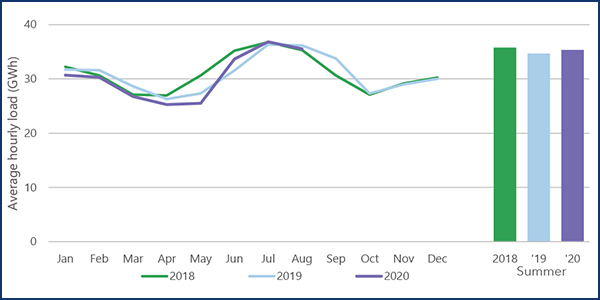This summer’s average hourly load in the SPP footprint was 2% higher than the year before, according to the Market Monitoring Unit’s quarterly State of the Market report for June through August.
The MMU credited warmer weather for the increase. Heating and cooling degree days were about 16% above the summer of 2019, with June degree days 36% higher than 2019 and July and August both up about 10%. The average hourly loads in the latter two months were nearly identical to the previous two summers.
Coal-fired generation continued to slide, down a point to 35% of the total generation mix. Wind generation increased to 25% of total generation from 20% last summer.
Average day-ahead prices and real-time prices were both down 12% from 2019. Day-ahead prices were $20.32/MWh and real-time prices were $19.69/MWh.
The MMU also reported that:
- market commitment status was 75% of all offered capacity, up from 68% the year before. Offered capacity in self-commitment status was down to 23%, a drop of 7 points from the year before.
- generation outages, which had increased from summer 2018 to 2019, reversed this year, with outages falling from 26,000 GWh to 22,500 GWh.
- day-ahead make whole payments doubled, from just over $7 million to more than $15 million, with coal payments increasing from $3.2 million to almost $8.7 million, and gas, simple-cycle payments jumping from $3.4 million to $5 million. “This increase is likely attributable to more resources in market status as compared to self-scheduled status and lower prices during the period,” the MMU said.
The report’s special issues section describes the MMU’s involvement in SPP’s transmission planning process, which has increased since 2018. The Monitor said it has served in an advisory capacity as the planning outcomes influence the market’s long-term efficiency through congestion patterns, operational effectiveness, costs and reliability.
The MMU will host a webinar to discuss the summer report on Wednesday.





